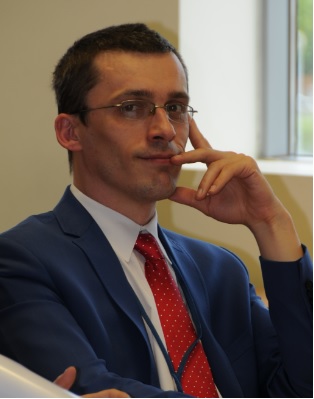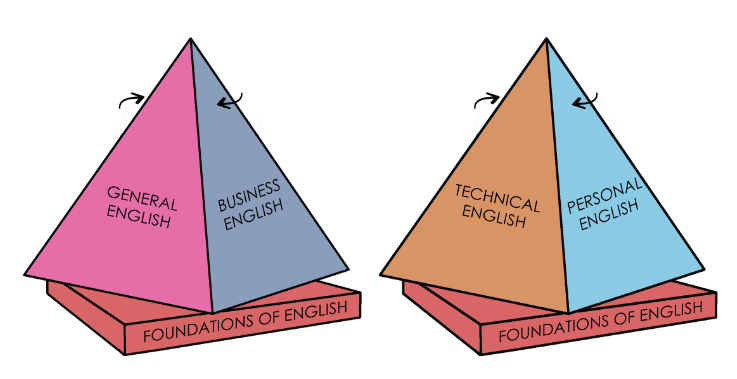 |
Contact details: michal.daszkiewicz@ug.edu.pl; tel. +48 509 747 531 |
| Affiliation: University of Gdańsk, Poland | |
| ERLA key words; language pedagogical paradigm, educational role of language skills, gap between reception and production, directed utterances, Composing Your Own English, linguistic identities | |
| ERLA key problems: How do we compose our language(s)? How do we experience our language(s)? How do we develop our language(s)? How do we treat our language(s)? |

I founded ERL Framework because of the simple, detrimental, surprising and somewhat paradoxical fact that although language is the key tool of education, educational systems are not built around it. Observing two things – first, how language determines learning and teaching on the level of beliefs, activity, emotions, and reasoning, and, second, how little educational and linguistic researchers had worked together, in 2016 I set up ERL Network organised around what later we coined Scope Minor – presented in detail in the text entitled “Educational Role of Language – Its Multi-faceted Scope and Its Social Complexity“, published in our “ERL Book I” (encompassing four areas – potential of language for general education, language activity of children, personal experiencing of language, and linguistic matrices of reality interpretation – which for some time were used as the four components of Scope Minor). Focusing on the relationship between language and education, in 2017 I led the publication of our “ERL Book II” entitled “Educational Role of Language Skills“, where, apart from a chapter in which I look at education through the prism of four language skills, I authored two chapters addressing the reciprocal relationship in question – “Learn to listen, listen to learn“, and – of my primary interest – “Learn to speak, speak to learn“. In 2018, following the third ERL Conference, I redefined the realm of the ERL Framework and expanded it with what we have come to refer to as Scope Major. The expansion prompted me to set up ERL Association as a formal structure not replacing its older “sibling” in the form of (informal) ERL Network but rather complementing it by being meant for wider projects, long-term cooperation, publication of ERL Journal, organisation of different ERL Events, and – probably more importantly – bringing about meaningful changes to the global world of education. Our joint work and consistent attempts at educational improvements are well exemplified by the publication entitled “In the Search of A Language Pedagogical Paradigm“, which I co-edited with Anna Dąbrowska (Poland, University of Warsaw) (with the two of us personifying the linguistic-pedagogical blend) and which gathered ERL-related academics addressing – in balance – the eight strands comprising ERLA’s full eight-strand scope. I personally believe that without the cooperation made possible by ERLA such a publication would not have come into being – which adds to my answer as to why I am in ERLA, where my role also relates to ERL Journal (editor-in-chief), ERL Events (main organiser) – ERL Conferences, ERL online Sessions, ERL Strokes, and the legal representation of the association.
|
“The position of language in education has clearly a paradigmatic character in that the role of language is evident in all four educational domains – axiological, psychomotor, aff ective and cognitive: it determines, respectively, what we think of particular subject matter, what we can do with it, how we feel  I find language to be the primary axis of education. Obvious as it may appear, this status of language tends to be grossly neglected and completely misunderstood by theoreticians and practitioners, who tend to take the educational position of language for granted and thus consider not worth dealing with in a systematic research-based manner. One good example comes from a clearly uninformed professor who compared the education role of language to that of food in a restaurant and, instead of recognising (thanks to her own analogy) the fundamental status of language, she – possibly due to the syntactic form of the phrase itself – deemed it senseless and thus unnecessary to address. It may be argued that such a narrow, mistaken and ill-willed approach is far from being surprising after so many years of educational systems not recognising the pivotal status of language. The concept ‘educational role of language’ designates an extensive field and as such it undoubtedly merits systematic in-depth research. We can recognise its interdiscisplinary character as we consider its multiple dimensions and their interdependencies. First, it cuts across different educational domains, with language co-determininig our beliefs (worldview), activity, emotions, ideas. Second, in each of these four domains it is processed and used differently as we listen, read, speak, and write. Third, language co-shapes the individual, society, culture, and reality – in each case – taking different paths, so to speak. This multidimensionality can be presented as follows and viewed as calling for joint work of specialists of various disciplines (who can be recognised by juxtaposing different dimensions – e.g. experts in the affective dimension of speaking, specialists of the cultural determinants of writing, researchers of the societal listening practices, scholars addressing the anthropological aspects of reading, and others): I myself concentrate on the personal experiencing of language on the level of individual learners, which has led me to develop the approach which I refer to as “Composing Your Own Language”. Its theoretical and practical facets I have presented in a cycle of four texts – “Compose Your Own English. Theoretical foundations and practical aspects of a personalized speaking-oriented EFL approach“, “Psycholinguistic study of personal approach of EFL students to learning English topical vocabulary“, “Language conventions – paradoxically – as grounds for EFL students’ (oracy-oriented) personal experience“, and “Language personality as a four-dimensional construct falling outside university students’ reflection“. The approach – and the ensuing English teaching method – rests on the recognition of “must-learn” topics (Foundations of English), on the one hand, and “can-learn” fields (modules comprising topics falling into general, business, technical, or personal English). Here lies a direct analogy to music (hence the eponymous ‘composing’), where one needs to be familiar with best-known pieces before one can proceed to creation (improvisation), motivated by one’s personal interests and preferences. 
On the most general level, my ERLA aspirations conform to those recognised by the Association – through its main twofold mission and through its formulation of how to boost the educational role of language. As complementary to ERLA’s overarching goals, I see the following as my own personal points of interests and goals at the instructional, systemic, cultural, and societal levels, respectively:
 and recognition and implementation of theories and practices serving their unbiased treatment, which can be visualised as: 

with this fundamental – and generally underestimated – fact (a) having far-reaching consequences for students’ entire education and, as a consequence, life, (b) calling for the development of whole-school language practices developed by language teachers along with specialists of different subjects, (c) cutting across the skills of listening, speaking, reading, and writing, and necessitating studies on the individual, social, cultural, and universal levels (as defined in the text on the ERL realm referred to above), and (d) constituting the key to successful communication between learners and teachers, and to their joint educational success.

 On the whole, the theoretical and empirical studies which I have undertaken and which I aspire to continue under ERLA partnerships pertain to four questions cutting across the educational domains named above. They are shown and briefly discussed below in a sequence reversing the usual ERLA order (beliefs-actions-emotions-thoughts) on temporal grounds – as our (largely unrealised and undirected) learning and sensing language(s) precedes our (increasingly more intentional and managed) improving and handling it/them. *
This question accentuates the uniqueness of language of every one of us. It calls for studies involving, inter alia, the neurolinguistic stratum. One study exemplifying the focus on language composing is that in which I examined how the complete mastery of topics is perceived by language learners as relating to structure, lexis, correctness, and fluency. As presented in ‘Do English learners from different countries approach (“compose”) topics differently. A study report, students prove to underestimate learning habits boosting control over the language learnt and demonstrate regular discrepancies between declared practices and indecisiveness in learning. *
This question emphasises the personalness of language learning and use, driven by a wide set of factors significant to particular learners. As such, it requires studies addressing, inter alia, the psycholinguistic component. This dimension has been addressed by me in, for instance, a study focused on grown-ups expressing themselves in English as their L2 and on the markedly emotional character of their decisions to do so. The study has been reported in the text entitled ‘Personal Experiencing of Spoken English by Poles‘ and it clearly shows how adult learners’ sense of oral productivity is boosted by provision of exemplary sets of questions and answers and application of means fostering their sense of achievement (techniques often – wrongly – associated with young learners only). *
This question stresses the progressiveness of all users’ (intra)language(s), which implies that there is always rooms for improvement regardless of the level of language command or age – and hence the need for glottodidactic expertise. One of the key studies I have conducted in this respect is that relating to the so-called directed utterances, understood as language content ready given by the teacher, textbook or any other source, and their beneficial effect (contrary to their diminised reputation). The study is presented in “A directed utterance as a personal educational event and a tool for seamlessness between (L1 and L2) reception and production“, with the application of directed utterances proving conducive to learning in lingusitic, social, and emotional terms.
*
This question highlights the subjectivity of language learning and use – both in the meaning of a language user being the agent as well as the characteristic opposite to objectivity, with each of us being in a kind of individualised relationship to language(s). This standpoint points to the salience of sociolinguistic aspects. Being particularly interested in how differently language(s) tend to be treated on the level of speech and its position in educational systems, I have led a project addressing ‘oracy in school culture’ aimed at a comparison between two European countries. The study and its results are outlined in “Comparative analysis of the approach to L1 oracy in Polish and Portuguese early education curricula“, where the treatment of oracy/orality is shown to have varied strongly and to be manifested in dissimilar guidelines. * Considered together, questions to the four questions above prompt answers which jointly delineate our – socially and culturally determined – comprehensive linguistic identities. What follows from this four-tier representation is that for our linguistic identities to be adequately and exhaustively recognised and studied, all the four facets must be taken into consideration. The four-tier complex can by the same token be regarded as denoting ideal language awareness and serving creation of modern language-teaching methods as well as performance of all-embracing educational linguistic studies.
Self References [1] Language Composing as the conceptual axis of a four-domain education paradigm, (in:) Daszkiewicz M., Dąbrowska A. (red.) Kraków, Oficyna Wydawnicza Impuls, 137. [2] Language personality as a four-dimensional construct falling outside university students’ reflection, Filologičeskie Nauki. Naučnye Doklady Vysšej Školy No. 2, s. 21-30; DOI: 10.20339/PhS.2-19.021, 28. [3] Educational Role of Language – Its Multi-faceted scope and its social complexity. In: Educational role of language, Michał Daszkiewicz, Anna Wasilewska, Ewa Filipiak, Ryszard Wenzel (eds.), Gdańsk : Wydawnictwo Naukowe Katedra, 2017, 50 [4] A directed utterance as a personal educational event and a tool for seamlessness between (L1 and L2) reception and production, In: Language education : controversies, observations and proposals / Danuta Stanulewicz, Karolina Janczukowicz, Małgorzata Rocławska-Daniluk (eds.), Frankfurt am Main [etc.] : Peter Lang, 2016, Gdańsk Studies in Language, 2196-016X, vol. 10, 222.
Copyright © 2024 International Association & Group for the EDUCATIONAL ROLE OF LANGUAGE — Primer WordPress theme by GoDaddy
|

